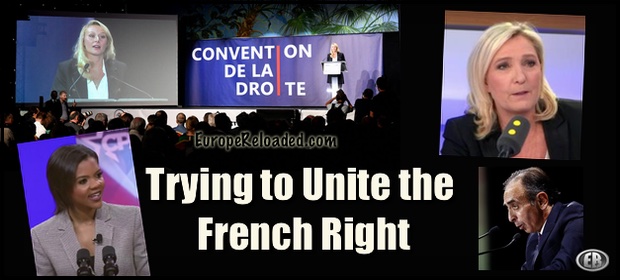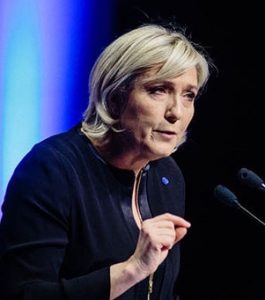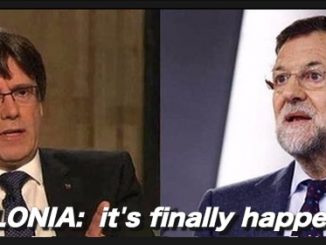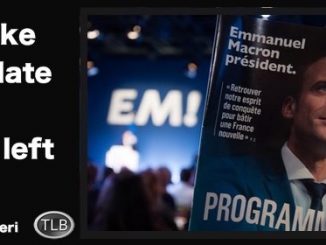
Pam Barker | Director of TLB Europe Reloaded Project
We remind readers of the recent piece we published on the conference of France’s Right, discussed below – France: More Death to Free Speech. We can recommend Eric Zemmour‘s (pictured below) highly sophisticated speech from this conference (English version), which predictably raised the ire of all the Government and Media puppets.
 As background information, RN or Rassemblement National mentioned below is the party of so-called far right Marine Le Pen (pictured; her party was formerly the Front National – FN – until it was rebranded), whom experienced analysts such as Alexander Mercouris describe as Gaullist (nationalist, big government). LR or Les Republicains were formerly led by Nicolas Sarkozy and are considered centre right, and likely as committed to a globalist agenda of mass immigration, etc., as anyone. We also remind readers of a piece we published a while back in which Jean-Yves Le Gallou commented from his professional experience that the French right has long been targeted by the gay lobby and Jewish lobby among others for splintering. According to Le Gallou in a piece we published in June titled From National Front to European Civilization, he says in response to the following question:
As background information, RN or Rassemblement National mentioned below is the party of so-called far right Marine Le Pen (pictured; her party was formerly the Front National – FN – until it was rebranded), whom experienced analysts such as Alexander Mercouris describe as Gaullist (nationalist, big government). LR or Les Republicains were formerly led by Nicolas Sarkozy and are considered centre right, and likely as committed to a globalist agenda of mass immigration, etc., as anyone. We also remind readers of a piece we published a while back in which Jean-Yves Le Gallou commented from his professional experience that the French right has long been targeted by the gay lobby and Jewish lobby among others for splintering. According to Le Gallou in a piece we published in June titled From National Front to European Civilization, he says in response to the following question:
Why did nationalist-conservative alliances become impossible?
In France, such alliances were forbidden by a certain number of pressure groups who considered them unacceptable: the Grand Orient of France (a left-wing Masonic lodge), the CRIF (Representative Council of Jewish Institutions of France), the so-called anti-racist groups, and the LGBT groups, working with the mass media. We were also opposed by the B’nai B’rith, usually a fairly discrete group, and even by the Conference of Bishops of France. All these forces fought against any possible alliance between the mainstream right and the FN, and tried to liquidate any politicians who were tempted.
The mass media and their demonization of dissenting politicians and thinkers are extremely important. The level of political correctness differs by country. In Italy, there is more freedom of tone and thought. [Interior Minister] Matteo Salvini expresses views while in government which Marin Le Pen cannot express even in the opposition! I think the Italian press is more pluralistic. The press in France is made up of the State on one side and 10 billionaires on the other. Alternative media still represent perhaps only 1% of the influence of the mainstream ones.
Thus the attempt to reconcile the various branches of the Right is a rather big deal. Dynastic in-fighting may be the new obstacle according to the article below, but grass roots pressure may overcome it.
********
France’s Right rebels
In Paris, representatives of various right-wing and conservative parties and organizations met in the autumn at an event organized by Marine Le Pen’s niece Marion Maréchal.
FREEWEST MEDIA
“This weekend was marked by a gathering […] in which the violence and the tone of the statements struck  me.[…] I found the speeches […] disgusting and incompatible with the concept of France that we have,” said a horrified French Prime Minister Edouard Philippe (pictured) at the end of September.
me.[…] I found the speeches […] disgusting and incompatible with the concept of France that we have,” said a horrified French Prime Minister Edouard Philippe (pictured) at the end of September.
His entourage confirmed that Philippe had been “alarmed by the statements made” at the event. “They were more than xenophobic, they were racist!” Because of these statements, the CSA – the French media regulatory authority – was called on 650 times. And because of these words, the journalists’ associations of TF1 and Le Figaro are now agitating for more censorship, while a newly established Brigade de la Repression de la violence contre la personne will be operating from the Paris prosecutor’s office.
The intense discomfort felt by the establishment came in the wake of the following statement:
“In the street, fully-veiled women and men in Jellabas are factual propaganda. The Islamization of the street reminds the vanquished of its subjugation in the face of the uniform of an occupying army. […] Any problems exacerbated by immigration will be made worse by Islam.”
These sentences were uttered by the French essayist Eric Zemmour on the occasion of the “Convention of the Right” at the end of September in Paris. It was covered by the oligarchic broadcaster LCI, which, in its hunt for quotas, committed the inattention of broadcasting the event live.
The “Convention of the Right” was launched by three young men around Marion Maréchal [formerly Maréchal-Le Pen, ed.] to “find an alternative to progressivism,” as the subtitle of the event stated.
Jacques de Guillebon, editor of the right-wing magazine L’Incorrect, Erik Tegnér, member of the bourgeois Republicans Party (LR) and president of the Association of Conservative Young Entrepreneurs Racines d’avenir, as well as François-Louis de Voyer, president of Cercle Audace, a business association associated with the Rassemblement National (RN).
Since the last two elections, it has become obvious that, on the one hand, the RN alone is unable to break the power of the established parties in France, and on the other hand, some rightwing supporters are only partially reflected in the ideologically thinned-out and, in their view, adapting RN. This traditional rightwing view was supposed to give the meeting the opportunity to exchange views and work towards a new, right-wing political gathering that goes beyond party structures.
Therefore, representatives of the LR and the RN were expressly invited. But in contrast to the young guard and local party activists of both parties, in the establishment of RN and LR there was no sign of any kind of alliance. Only two MPs had accepted the invitation: the traditionalist Xavier Breton (LR) and Gilbert Collard (RN).
 RN’s MEP, Nicolas Bay (pictured), said he might attend, but made it dependent on Marine Le Pen’s position. However, she had “advised” her deputies to stay away from this “discussion between conservative Catholics” because “this direction has been proved to be a failure in the EU elections”. Marine Le Pen made reference to the poor performance of the LR, whose top candidate François-Xavier Bellamy is considered a conservative Catholic, while a majority of Macron-compatible “rightwingers” has been added to the list.
RN’s MEP, Nicolas Bay (pictured), said he might attend, but made it dependent on Marine Le Pen’s position. However, she had “advised” her deputies to stay away from this “discussion between conservative Catholics” because “this direction has been proved to be a failure in the EU elections”. Marine Le Pen made reference to the poor performance of the LR, whose top candidate François-Xavier Bellamy is considered a conservative Catholic, while a majority of Macron-compatible “rightwingers” has been added to the list.
In reality, however, Marine Le Pen’s negative attitude is probably less based on strategic differences but on ideology and fear of losing power in the RN. At a party seminar in 2016, she had told stunned cadres that she “does not know the right and did not come from them”.
The seriousness of her statement is shown not only by the economic programme of the RN, in which market-economy related elements have since been scaled down, but also by the so-called “devil’s strategy”, which represents nothing more than an increased adjustment of socio-political issues.
Ever since its announcement, purges in the party apparatus have mirrored this ideological change of direction. Not only her father and founder of the party, Jean-Marie Le Pen, has fallen victim to it so far, but also almost the entire intellectual elite of the party, which came mostly from the Catholic-traditionalist milieu, as well as the followers of the charismatic, traditionally rightwing niece Marion.
This elite functioned as a bridge between the highly non-religious and de-culturalized working class and the conservative, patriotic bourgeoisie. In economic matters, it combined free enterprise with the commitment to a life worthy of the common man living by toil. The new party elite, on the other hand, focuses on class struggle and on sociopolitical questions regarding libertinism.
In order to consolidate her own position and the ideological realignment of the RN, Marine Le Pen ensured after this year’s EU elections that even among the parliamentary staff of the faction in Strasbourg and Brussels there were no followers of her niece Marion left.
Because all the experience of the last decades has shown that splits from the FN or right-wing party foundations are in vain, the traditionalists around Marion Maréchal are now trying to build a new structure around the RN that integrates the RN as a right-wing party, but at the same time able to bypass the person of Marine Le Pen.
The collapse of the LR offers a unique opportunity to reach out to the common people. More than 100 local LR officers followed the invitation to the “Convention of the right” as well as numerous local politicians of the RN, right-wing citizen movements and intellectuals. In total, 2 000 people came together.
 The French essayist Eric Zemmour (pictured), with a Jewish-Algerian background, and one of France’s best-known and most controversial intellectuals, who was recently fined €3,000 for “incitement to religious hatred,” opened the meeting with an extremely combative speech which led to the reactions mentioned above.
The French essayist Eric Zemmour (pictured), with a Jewish-Algerian background, and one of France’s best-known and most controversial intellectuals, who was recently fined €3,000 for “incitement to religious hatred,” opened the meeting with an extremely combative speech which led to the reactions mentioned above.
Contrary to the mass media coverage, it was not a racist speech, but a reckoning with liberalism and political Islam, “these two universalisms that are both rivals and accomplices”.
“We are trapped between the anvil and the hammer of these two universalisms that oppress our nations, our peoples, our territories, our traditions, our way of life, our cultures: on the one hand, the universalism of commerce, which subordinates our brains in the name of human rights, to transform us into uprooted zombies; on the other hand, Islamic universalism, which cleverly uses our human rights religion to carry out its occupation and colonization […] operation,” Zemmour said.
Alluding to the obsession of “good” France with the 1930s, Zemmour even spoke of a “new German-Soviet Treaty”.
“Both totalitarians have joined forces to destroy us before they mutilate one another. […] The liberal human rights activists, the metropolises, the Islam of the banlieus [migrant neighbourhoods]. Some serve the others as servants: pizza deliverers, taxis, childminders, restaurant kitchens and drugs. The others, by their media and legal power, protect their servants from the blind hatred of this French people, which they both despise, one and the other; some because it’s French and not American, the other because it’s Catholic and not Muslim culture.”
To achieve their goal of destroying French culture, the joint attacks of Liberals and Islamists have focused on the “white, heterosexual, Catholic man”, the guarantor and protector of this civilization.
Robert Ménard, the mayor of Béziers who governs thanks to an alliance of RN, LR and right-wing factions, and who has repeatedly tried in vain to unite the right, vented his frustration with the right-wing trench warfare. “It’s the last time I come [to such an event]!”, he warned the participants of the meeting. He complained especially about the cowardice and ideological emptiness of the so-called right-wing parties. His wife, non-party deputy Emmanuelle Ménard, had led the fight against the majority-planned law on fatherless artificial insemination almost completely alone in the Assemblée Nationale [French parliament]. Neither the members of the LR nor the RN actively intervened in the debate.
Xavier Breton, who is also in a losing battle in parliament and in his own party, underlined Robert Ménard’s statement.
Very interesting was the intervention of the philosopher Raphaël Enthoven, who, at the invitation of the organizers, was to deliver the liberal alternative to the Rightist worldview. But instead of advocating liberal positions, he went into abstract deconstructionist concepts that culminated in the denial of one’s own existence:
“We have no identity (except for our memories, our habits and the peculiarities of DNA), and what we imagine to be a root is just a pile of dead leaves. […] One recognizes a sheep because it has the feeling of having an identity, that is the identity that it has to defend its identity against other identities.”
 After his intervention, Marion Maréchal explained that today “the political frontier no longer runs between right and left, but between ideologues and realists.” As in a programmatic campaign speech, she named the “five big challenges” that politics will have to face in the near future: The so-called “big exchange”, that is, the demographic development to the detriment of the indigenous population that overshadows all other problems, the “Great Descent”, the impoverishment of large parts of society as a result of globalization and financial capitalism, the “Great Economic Exhaustion”, the end of agriculture, the “Great Anthropological Revolution”, by which she means eugenism and transhumanism, and the “Great Clash of Powers”, ie wars for economic resources and power.
After his intervention, Marion Maréchal explained that today “the political frontier no longer runs between right and left, but between ideologues and realists.” As in a programmatic campaign speech, she named the “five big challenges” that politics will have to face in the near future: The so-called “big exchange”, that is, the demographic development to the detriment of the indigenous population that overshadows all other problems, the “Great Descent”, the impoverishment of large parts of society as a result of globalization and financial capitalism, the “Great Economic Exhaustion”, the end of agriculture, the “Great Anthropological Revolution”, by which she means eugenism and transhumanism, and the “Great Clash of Powers”, ie wars for economic resources and power.
Maréchal expressed her conviction that the Right would come to power in the near future, but she insisted on patience: “I understand the impatience and the frustrations. But who believes that our ideas will come to power if we do not break through the fronts first? We have to build on a rock, not on media effects. On ideas, on loyalty, on networks and on local elected representatives”. Maréchal also urged the participants not to wait for a savior, but to become active themselves. The “savior” for many French people, however, is Marion Maréchal, who combines charisma and a solid ideological framework. But so  far, she has denied any presidential ambitions. In any case, she was lauded profusely at the meeting and even eclipsed US guest speaker Candace Owens.
far, she has denied any presidential ambitions. In any case, she was lauded profusely at the meeting and even eclipsed US guest speaker Candace Owens.
Owens, a young black political activist from the Trump circle who tries to convince black people to withdraw from the Democratic Party, talked about the power of patriotism and about liberals’ dependency on ethnic minorities in order to consolidate their own power.
However, Owen’s appearance also made it clear which civilizational divide lies between France and the United States, despite all similarities between the right-wing Americans and the French. While the United States, a multicultural state founded on the eradication of indigenous peoples, is built on a value system, France is a civilization built on the rubble of antiquity as a synthesis of Catholicism and a local population. Both concepts of state have been involved in a battle for life and death on French soil since the days of the Revolution.
For some local politicians of the RN, participation in the right-wing meeting in the following days had an aftermath: Marine Le Pen had specially sent a close associate to the event to control who was present from their party. Thus, the former Cabinet Director of Jean-Marie Le Pen and today’s deputy of the Parliament of the Pays de la Loire, Pascal Gannat, was excluded from the party.
Officially this was because of his unpaid campaign debts, but unofficially because of his participation in the event. But this decision of Marine Le Pen could lead to a boomerang effect: The RN faction in the regional parliament is threatening to break away from the party five months before the local elections.
Four of the ten MPs have already announced a party exit. The secretary-general of the RN in the department of Sarthe and also a member of the Pays de la Loire region, Pascal Nicot, stated that there was a large majority, both at the departmental and regional levels, for a right-wing collective list in the local elections in Spring.
In Le Mans, the RN is already working with representatives of the Christian Democrats, the LR, and Débout La France (DLF) on such a list. In the regional parliament, it wanted to enforce a change of name of the group to allow an opening to other right-wing parties – especially the LR, in whose ranks the different ideological lines led to tensions. And if the RN leadership is to show resistance to the notion, Nicot has threatened consequences.
************
Original article

••••
The Liberty Beacon Project is now expanding at a near exponential rate, and for this we are grateful and excited! But we must also be practical. For 7 years we have not asked for any donations, and have built this project with our own funds as we grew. We are now experiencing ever increasing growing pains due to the large number of websites and projects we represent. So we have just installed donation buttons on our websites and ask that you consider this when you visit them. Nothing is too small. We thank you for all your support and your considerations … (TLB)
••••
Comment Policy: As a privately owned web site, we reserve the right to remove comments that contain spam, advertising, vulgarity, threats of violence, racism, or personal/abusive attacks on other users. This also applies to trolling, the use of more than one alias, or just intentional mischief. Enforcement of this policy is at the discretion of this websites administrators. Repeat offenders may be blocked or permanently banned without prior warning.
••••
Disclaimer: TLB websites contain copyrighted material the use of which has not always been specifically authorized by the copyright owner. We are making such material available to our readers under the provisions of “fair use” in an effort to advance a better understanding of political, health, economic and social issues. The material on this site is distributed without profit to those who have expressed a prior interest in receiving it for research and educational purposes. If you wish to use copyrighted material for purposes other than “fair use” you must request permission from the copyright owner.
••••
Disclaimer: The information and opinions shared are for informational purposes only including, but not limited to, text, graphics, images and other material are not intended as medical advice or instruction. Nothing mentioned is intended to be a substitute for professional medical advice, diagnosis or treatment.




